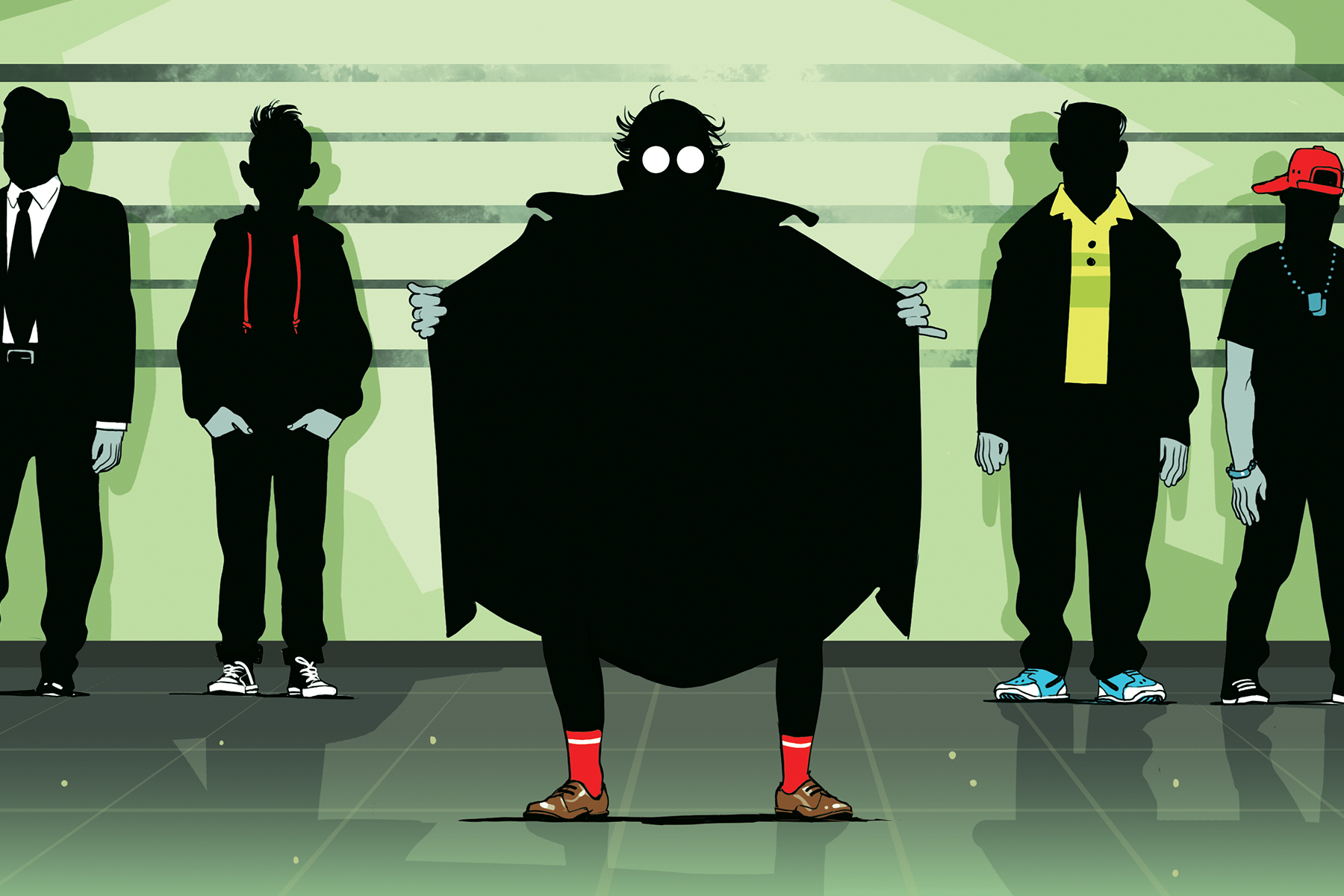One September Sunday last year, I was walking my dogs on Travis Street, just north of West Village, when a black man in an older-model gray Ford pulled up and asked me how to get to City Hall. It was a beautiful morning, and I was feeling neighborly, so I gave the man directions. He asked me to repeat them, and I told him again how to get to his downtown destination. During the exchange, I noticed his close-cropped black hair and the way his oversize metal-rim glasses emphasized his brown eyes. When he spoke, a half-dozen silver caps flashed in his mouth. After a minute or two, though, I dropped my eyes from his face to his lap and saw that he was leisurely masturbating.
I stepped back in surprise. A smart voice in my head told me to get the license plate number. As the Ford rolled slowly forward, I repeated the six digits under my breath and headed home. Two minutes later, as I approached my building, I saw the gray Ford coming toward me. The man waved as he passed by. I couldn’t believe it at first. Had he really circled the block so he could wave at me?
I rushed into my condo and called 911. I told the operator what had happened, but when she asked if I wanted a police officer to come make an official report, I declined. It was gross and weird, and I’d been startled, but this is the big city. These things happen. I didn’t think the event was serious enough to warrant the attention of the resource-strapped Dallas Police Department. Instead, I gave the neighbors a heads-up on Nextdoor. I typed: “Indecent Exposure in Uptown SUNDAY 10 AM” and proceeded to share the tale.
People chimed in fast, including a woman who had been walking her dog and was approached by the masturbator only minutes after I’d seen him, a man who urged me to reconsider filing an official police report, and a neighbor who noted that the DPD blog had a post about a similar incident, right down to the capped teeth. OK, I thought. Maybe this does deserve an official report.
So I called 911 back and asked the operator to send an officer. I called the detective whose number was listed at the end of the DPD blog post and left a voicemail. And then I went for ice cream with my girlfriends, where I not only told my story, I acted it out. Squeals of ewwww were followed by peals of laughter.
The next morning, Detective Chris Anderson called and asked if I’d be willing to look at a photo lineup. I was surprised to learn that the detective hadn’t gotten my voicemail. He’d contacted me after reviewing the previous day’s 911 calls. For an understaffed department, that seemed like an impressive level of diligence. Why would DPD devote that sort of effort to tracking down a man accused of driving around Uptown with his junk out? I told Anderson I would come in the next day.
Picking a suspect out of a photo lineup was way harder than I thought it would be. I walked in confidently to the small, windowless room at police headquarters on Lamar Street, where I sat with a woman who said she knew nothing about the case. After telling me that the alleged masturbator might not be in the lineup, she pulled six mugshots of black men, one by one, from a stack of manila folders. The lady asked me to say “yes,” “no,” or “not sure” about each. With each photo she showed me, my self-assurance waned.
Anderson called to tell me that the masturbator was in jail. Yes! I’d picked the right person! But my next thought took me in another direction. Did the man really deserve to be incarcerated for what he’d done?
In 2009, after a string of wrongful convictions, DPD became the nation’s largest police department to use what are called double-blind sequential photo lineups. It’s an identification technique in which a person who doesn’t know who the suspect is shows a witness a series of photos one at a time. Designed to reduce the number of eyewitness misidentifications, it’s purposefully difficult. Though I could spend as much time looking at each photo as I wanted to, I was not allowed to compare any two side by side or see them all at once.
Some of the photos drew a quick no. It definitely wasn’t the man with green eyes. It also wasn’t the light-skinned twentysomething. I was less certain about others. None wore glasses. None showed their teeth. I had not seen the man’s face from the front. However, there was one photo that piqued my interest more than the others. I studied it closely. I tried to imagine the person smiling. I held it at arm’s length and tried to see the face in profile.
“I am pretty sure this is him,” I said, handing the photo back to the woman.
“Yes, no, or not sure?” she asked matter-of-factly.
“Yes,” I said, hoping I’d chosen the perp.
Three weeks later, Anderson called to tell me that the masturbator was in jail. Yes! I’d picked the right person! But my next thought took me in another direction. Did the man really deserve to be incarcerated for what he’d done? It wasn’t like he’d physically assaulted anyone.
I was sitting at my desk in January when the phone rang. An investigator at the Dallas County District Attorney’s Office asked for my email address and then sent me a subpoena. I was ordered to appear in District Court in February as a witness in a case of indecent exposure. That was when I learned the masturbator’s name and that an incident had occurred before mine. It involved a minor. Ugh.
Before I had to testify, though, the defendant accepted a plea bargain and received four years in prison and 10 years as a registered sex offender after his release. When I heard the news, a wave of compassion sunk my heart. This mentally ill man would not get the help he needed. That’s not what happens in prison. Then everything changed.
Dallas County has made it brilliantly easy to do a criminal background check. When I searched the man’s name in its court records database after his sentencing, I was served a list of one dozen offenses. “Murder” appeared like a punch in the nose. What had seemed silly now felt sinister.
I read through the documents for all of the charges, which also included evading arrest, driving with a suspended license, felony possession of a firearm, and felony possession of marijuana. The 2007 murder charge had been dismissed in 2009. A 2010 drug charge resulted in a seven-year prison sentence.
Well, I thought, this is a pretty bad guy who breaks the law a lot. He may even have gotten away with murder. I stopped feeling bad that he was behind bars. For a minute.
The file for the case involving exposure with a child included a handwritten letter to the judge from the defendant. The letter started: “This is a plea for help.” It went on to detail childhood molestation, early exposure to pornography, chronic drug use, bipolar disorder, schizophrenia, and brain injury. Some people might dismiss that letter as a criminal’s attempt to manipulate a judge. I couldn’t. It hit me in the soft part of my soul—as did the face of the man’s 8-year-old son on his Facebook page. Humans are complex creatures. Even criminals contain multitudes.
And even seemingly “small” crimes should be reported—not just on Nextdoor—because you never know when a public masturbator is an accused murderer with a history of mental illness who is out on bond while awaiting arraignment for an earlier offense. The day I went in to look at the photo lineup, Anderson told me that the DPD was close to 1,000 officers short. Nevertheless, he and his colleagues were swift and thorough with their investigation, and a man with a habit of menacing behavior is no longer driving around masturbating or selling drugs or taking his kid to Target.
I did the right thing. I still don’t know how I feel about that.
Write to [email protected].







